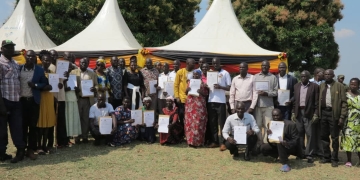
FORT PORTAL, Uganda (UG Standard) — Defence Attachés accredited to Uganda commended the Uganda People’s Defence Forces (UPDF) for its outstanding contributions to stabilizing the volatile eastern Democratic Republic of Congo.
The praise came during a visit by 16 Defence Attachés, representing various embassies in Uganda, to the UPDF’s Mountain Division headquarters in Fort Portal City.
Dean Col. Patrick Nkaduda of the Kenyan Embassy led the delegation, which sought updates on Operation Shujaa, a joint Ugandan-Congolese military operation targeting the Allied Democratic Forces (ADF) terrorist group.
“The fruits of your efforts are visible,” Nkaduda said, praising the UPDF’s dedication to combating global terrorism.
The Defence Attachés thanked the UPDF for its openness and willingness to engage with them across various departments.
Emphasizing the need for collaborative action against terrorism, the diplomats pledged support for the UPDF’s mission to eradicate the ADF and ensure regional stability.
Col. Godfrey Kyomuhendo, UPDF Mountain Division commander, welcomed the diplomats’ interest in the anti-terrorism efforts.
“Fighting the ADF is not merely a UPDF/FARDC affair; it’s a collective responsibility,” Kyomuhendo said. “Your interest and support energize our moral spirit to combat this threat.”
The visit included a tour of Uganda’s tourism attractions, including the dramatic landscapes of the Rwenzori Mountain ranges and the hot springs of Semliki National Park.
The Defence Attachés expressed interest in organizing future visits to these sites with their families.
The security situation in the DRC has been volatile for years, with various armed groups operating in the region.
Before the UPDF intervention, the DRC was plagued by violence and instability, particularly in the eastern regions.
Pre-UPDF Intervention:
The DRC experienced widespread violence and instability in the eastern regions, with over 100 armed groups active in the area, including the Allied Democratic Forces (ADF). This led to human rights abuses, looting of natural resources, and displacement of civilians. The International Court of Justice also found Uganda guilty of violating international law by supporting and arming rebel groups in the DRC during the Second Congo War (1998-2003).
Post-UPDF Intervention (Operation Shujaa):
The UPDF’s intervention has resulted in a reduced ADF presence and activity in some areas. Significant amounts of ammunition and explosives have been recovered, and civilians have been rescued from ADF captivity. Regional cooperation and intelligence sharing have also improved.
Current Security Challenges:
Terrorist threats from groups like the ADF remain a concern, along with intercommunal violence and clashes between rival ethnic groups. Human rights abuses by various actors, including security forces, persist. Other armed groups, such as Mai Mai and M23, are still active in the region.
Efforts to Address Security Concerns:
Regional cooperation between the UPDF, DRC military, and other regional forces continues to play a crucial role in addressing security concerns. International support from organizations like the United Nations is also essential. Ongoing military operations aim to degrade ADF capabilities, while humanitarian assistance is provided to affected populations.
Despite these efforts, the security situation in the DRC remains fragile. Ongoing international support and cooperation are crucial to consolidating gains and ensuring long-term stability in the region.










Discussion about this post